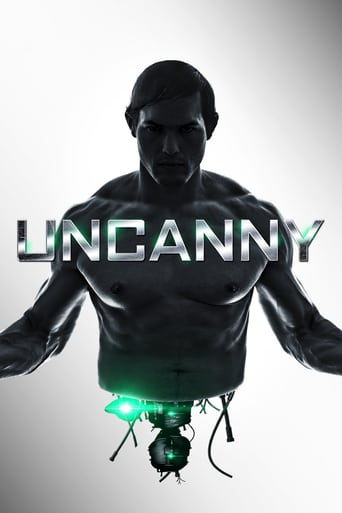SnoopyStyle
Reporter Joy Andrews (Lucy Griffiths) does an in-depth week-long interview with tech scientist David Kressen (Mark Webber). He introduces her to Adam (David Clayton Rogers) and later reveals that Adam is actually an AI robot. His wealthy boss Castle (Rainn Wilson) monitors the situation from afar.Coming out around the same time, this was being overshadowed by the indie hit Ex Machina. There is an obvious visual CGI wow factor about Ex Machina that this does not have. Leaving that aside, they are both traveling on similar and well-worn sci-fi lanes. The acting for both male leads is limited to the stiff robotic nerd persona or an actual robot. Griffiths has an easy presence. I'm always taken by her brilliant blue eyes. This is an extended Twilight Zone episode or Black Mirror for the modern audience. It's a perfectly capable film that stays compelling to the end.
petercafe
For such a modest budget in comparison to The later Alex Garland movie 'Ex Machina', I found it to be a fantastically, realistic interpretation of how a scientist who has been isolated from society with such a "single purpose" focus on such a daunting and complex task, may be in actuality. Sure, no "society destroying, death to humans" Skynet, and nowhere near the cinematic beauty or romance of 'Blade Runner'... Instead, a bare bolts, the "real life" way it would more than likely undergo introduction to outside human interaction and testing, vision of the creation of such an amazing level of A.I. And a great credit to both Matthew Leutwyler and Shahin Chandrasoma.
MrFilmic
Although well traversed, especially more so since the turn of the century, artificial intelligence and its impact on humanity remains one of the main Sci-Fi tropes. Android certainly fits into this category, well written and well acted for the most part it does however ultimately let itself down at the final hurdle, with an ending that seems more fitting of a lesser film With shadows of Ex Machina and the excellent Westworld TV series, Android tackles the concepts of human vs created awareness, with some expected and unexpected consequences. With only 4 characters on screen the script is effective and the performances are engaging Certainly worth watching and without giving anything away, expect to be stimulated cerebrally rather than adrenergically!
tktansey
That Matthew Leutwyler's sci-fi chamber piece "Uncanny" was made 3 years before Alex Garland's "Ex Machina" is interesting. That Leutwyler made his film for a fraction of Garland's budget is admirable. That Leutwyler's plot doesn't make a lick of sense is a shame.Seriously, what was the point?"Uncanny" and "Ex Machina" share similar story lines: an outsider is invited into the high-security lair of a reclusive genius in order to interact with and evaluate a new form of artificial intelligence. In each case, the outsider and the AI are of different genders and the reclusive genius has an agenda. Predictable consequences ensue. But where "Ex Machina" follows these events to their logical conclusion, "Uncanny" gives up on logic entirely for the sake of a surprise ending that a) isn't much of a surprise and b) negates almost everything that happened over the preceding 80 minutes.On paper, the movie was probably conceived to be an insightful meditation on what makes humans humane and robots less so. Thrown in for good measure are some thoughts on what can and can't be controlled in sentient beings and whether we as a race are innovating and engineering ourselves right into obsolescence. There's also a bit about masters and servants and which are which. All big, important ideas that Garland's film handles with much more style and intelligence. Still, it wasn't "Ex Machina" I thought about as I watched the film. What came to mind more was "Frankenstein." The book, not the movie. In the book, there's a relationship between the creator and his creation. They're in this together in the name of science and discovery. But that relationship sours when Dr. Frankenstein rejects the monster to be with his fiancée. I'm paraphrasing here, but that's the gist. "Uncanny" seemed to be moving in a similar direction. Actually, the movie was moving in exactly that direction. There was even the interesting possibility that roles were being reversed.Then came the final cryptic ten minutes and it all turned out to be a huge waste of time. Adding insult to injury, there's an end-credits scene so nonsensical it's laugh-out-loud funny. Not, I'm guessing, what the filmmakers intended."Uncanny" isn't a bad movie, it's a bad story. The cinematography is fine (though the lingering shots of Shiva, the Destroyer, are a bit overly), the acting is adequate (if you don't mind watching Rainn Wilson, in a mercifully short cameo, chew scenery), and events move along at a fairly brisk pace. It's just that those events simply don't add up when you get to the end. Note: One question bothered me as I watched both "Uncanny" and "Ex Machina". Why, why, why—if you're going to build a creature and make it both smarter and stronger than yourself—why wouldn't you include an "off" switch?





